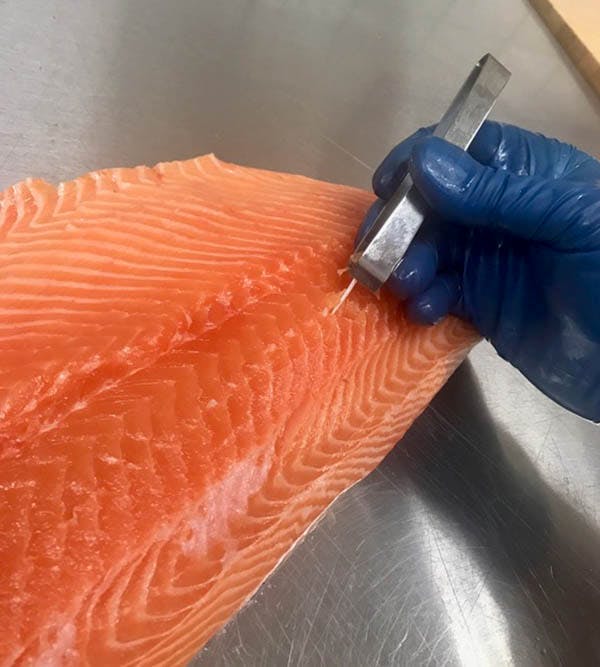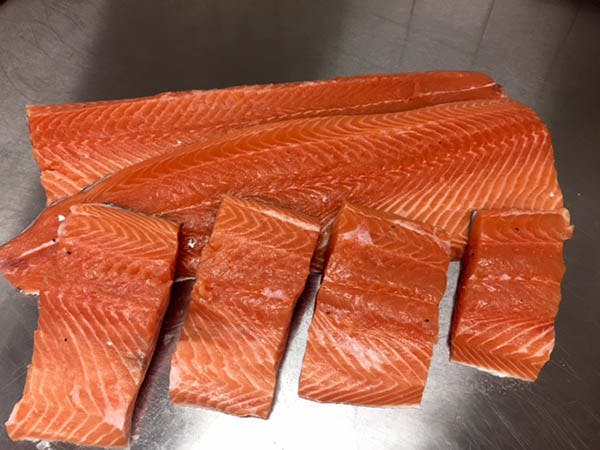The Butcher's Guide to Filleting a Fish
Learning to filet a fish will guarantee it’s the freshest it can possibly be. It’s also more economical to process the fish yourself. Sometimes the store will buy filets instead of doing the work in-store, leaving you to wonder…where was it fileted? When and how many times was it handled? Learning how to filet a fish is really not that difficult. With a little practice, you’ll be a pro!
.jpg?auto=compress,format)
BUYING A WHOLE FISH
You will want to check the gills; they should be a bright red color. A fish that’s been around a while will have darker red to brown gills. A fresh fish will have eyes that are slightly plump and clear, not foggy or sunken into the head. You should also feel the fish; it should be firm to the touch, not soft and mushy. Make sure all the fins are intact; if some are missing it might be a sign of mishandling. Lastly, smell the fish; it should have a fresh, clean water, mild smell. Avoid any fish that has a strong, nasty smell… it’s not fresh!
TOOLS
- Chef's knife and a boning knife. Be sure your knives are sharp! Check out my blog about knife skills to learn how to take care of your knives. I like to use a boning knife with a 6-inch semi-flexible blade. This will allow you to apply the right amount of pressure on the delicate spine of the fish.
- Cutting board and workspace. Use the right size board, and have ample room to process your fish. Plan it out!
- Large tweezers. There will be a line of “Pin Bones” in the filet, which need to be plucked out by hand.
FILLETING A WHOLE FISH
Lay the fish on its side to remove the head. With your chef’s knife or boning knife, whichever you prefer, make an incision just past the gills and pectoral fins until you hit the spine; apply some pressure with the knife to cut through the bone. Finish cutting through until the head is off.
.jpg?auto=compress,format)
Now you can see the spine of the fish. At this point you can either make some crosscut steaks or filet the entire fish. To make steaks simply cut through the fish about an inch and a half thick. Crosscut steaks have a nice presentation and are great for grilling; the skin and bones will help keep the fish from falling apart.
.jpg?auto=compress,format)
To filet, start at the head end of the fish, and run your boning knife along the spine just above the dorsal fin, all the way to the tail. The depth of the tip of the knife should be just beyond the spine. Now run the knife along the ribs and the filet should be off the bone. Set that filet aside and turn the fish over. Do the same on this side
.jpg?auto=compress,format)
.jpg?auto=compress,format)
TRIMMING A FILET
Now that you have accomplished fileting your fish, there is still a little more work to be done. Trim the belly fat; some fish have more than others, but all need to be trimmed off.
.jpg?auto=compress,format)
PIN BONES
If you run your finger along the middle of the filet from the head end down, you’ll feel a line of tiny bones (pin bones) which end about two thirds of the way down. These pin bones must be plucked out by hand. Large tweezers work best for this task.

The only thing left is to decide if you want to leave the filets whole or to cut into serving size portions for the grill.

For more inspiration check out this blog about tips for grilling fish. Fish on!!! Grill on!!!



